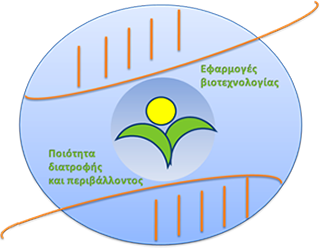Learning outcomes
Students will be introduced to modern approaches of biotechnology and synthetic biology of the recent years with applications in the fields of nutrition and the environment. Emphasis will be given on:
- understanding the principles underlying biotechnology and synthetic (or engineering) biology, as well as the similarities and differences between these approaches.
- understanding the “toolbox” of synthetic biology and the potential for its use in a multitude of applications in agri-food, the environment and health.
- understanding the principles of bioswitches and biosensors and their variable uses.
- understanding the basic principles of synthetic microbial ecology.
- understanding the principles of “directed evolution” and the possibilities of designing enzymes with desirable properties.
- understanding next-generation sequencing approaches and their applications in nutrition and the environment.
- understanding the necessity of bioinformatics/biostatistical analysis tools in modern food and environmental microbiology.
- understanding the basic principles and the strategic application of modern bioinformatic methods for microbiome analysis in nutrition and the environment.
- understanding the fundamentals of 3D printing and the combination of materials, techniques and principles that govern the preparation and manufacture of complex custom foods.
Outline of course content
- Principles and interdisciplinarity of Synthetic Biology.
- Synthetic biology, engineering biology or biotechnology. The concepts of “modular design”, “orthogonality” and the DBTL (Design-Build-Test-Learn) cycle.
- Tools and applications of Synthetic Biology.
- Modern cloning and genome editing technologies.
- Applications of synthetic biology in agri-food and the environment.
- Bioswitches
- Concept, structure and function of natural bioswitches.
- Examples and biotechnological applications of bioswitches in the environment.
- Synthetic microbial communities.
- What is synthetic microbial ecology?
- Basic principles governing the interaction between microorganisms.
- Methods for generating synthetic microbial communities.
- Applications of synthetic microbial communities in health, nutrition and the environment.
- Directed enzyme evolution and synthetic metabolism with applications in Nutrition and the Environment.
- Synthetic metabolism and metabolic engineering.
- Directed evolution of enzymes as a tool of metabolic engineering.
- Methodological approaches and examples with applications in “green” biotechnology.
- Biosensors
- The concept of biosensor and its components
- Different types of biosensors (electrochemical, amperometric, potentiometric, impedimetric, voltammetric).
- Applications of biosensors in nutrition, health and the environment.
- 3D printing and its applications in food.
- Types of 3D printing technologies.
- Functional traits of food ingredients that are adapted to the printing process for achieving maintenance of post printing desired food quality traits.
- Next generation sequencing.
- Current trends in next-generation sequencing.
- Next generation sequencing applications in food and the environment.
- In silico analysis and data processing – bioinformatics as an analytical tool in food, nutrition and the environment.
- Modern microbiome analysis strategies and big data.
- Applications of bioinformatics/biostatistical analysis to sequencing data of next-generation sequencing of PCR products of phylogenetic markers: sequencing methods, data quality control, sequence clustering into ASVs/OTUs, taxonomy classification, α/β-diversity.
- Applications of bioinformatics/biostatistical analysis to shotgun sequencing data: sequencing methods, data quality control, metagenomic assembly-based and assembly-free strategies, taxonomy and functional annotation.
